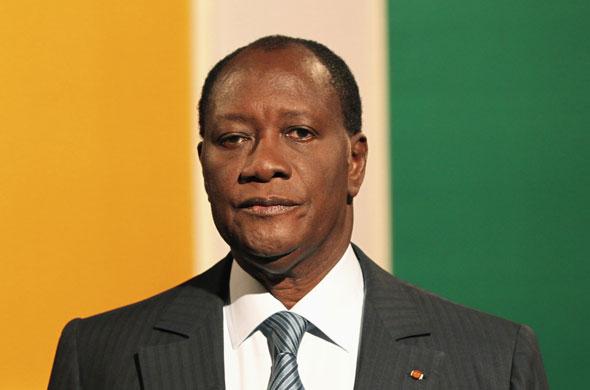Not too late for Côte d’Ivoire to raise its gaze beyond sectional interests in prosecuting post-election crimes

Prosecution efforts so far have exacerbated, rather than alleviated, ethnic and regional divisions. Credible prosecutions against those most responsible on all sides of the conflict would offer a clear statement to all citizens of Côte d’Ivoire that the justice system is blind to ethnicity and is there to serve and protect all its citizens.
Victims in Côte d’Ivoire have yet to see justice for the serious human rights abuses perpetrated by both sides during the 2010-11 post-election crisis. President Alassane Ouattara early in his presidency made solemn commitments to bring perpetrators to account, but has delivered very little. And the court’s slow pace and lack of transparency in judicial proceedings relating to the crisis have left justice open to conjecture by citizens and exploitation by party politics.
Since the crisis, only one person in Côte d’Ivoire, Simone Gbagbo, wife of former President Laurent Gbagbo, is being tried by the Assize Court in Abidjan for serious human rights violations related to the post-electoral crisis. When the former Prosecutor of the International Criminal Court (ICC) Luis Moreno Ocampo opened the investigation into the Côte d’Ivoire situation in 2011, he said he would adopt a “sequencing approach,” dealing first with alleged crimes on the Gbagbo side before turning to allegations against the Ouattarra side.
In fact, that approach has perpetuated a sense of “victor’s justice.” All three suspects indicted so far by the ICC are Gbagbo loyalists. Because political leaders have manipulated ethno-regional divisions in Côte d’Ivoire for decades, some have expressed concern that the ICC’s current prosecution strategy is exacerbating this tension.
Initially, the new government under Ouattara was applauded for inviting the ICC to investigate alleged violations committed in the country. (Côte d’Ivoire was not a party to the Rome Statute of the ICC at the time of the violence. In fact, Gbagbo when president had granted the ICC jurisdiction after violence in 2003. The same permission — as allowed by the Rome Statute — was granted by Ouattara when he became president.) Within weeks, the ICC issued an arrest warrant against former President Laurent Gbagbo; his wife, Simone Gbagbo; and former Youth Minister Charles Blé Goudé. Soon after, Laurent Gbagbo was transferred to The Hague to face trial.
The Ouattara government’s position on transferring suspects to the ICC has been confusing. Laurent Gbagbo was remitted promptly, but many speculated that this was because Ouattara saw it as serving his own interests, since Gbagbo still commanded significant public support. In late 2012 the President said that all future prosecutions of serious crimes would happen in the national courts, claiming that the national justice system, sorely neglected for many years, was fully operational. He insisted that Simone Ggagbo and Blé Goudé would not be transferred to The Hague. Yet, for reasons still unclear (despite much speculation), Blé Goudé was transferred to the ICC in March 2014.
The Government has refused to transfer Simone Gbagbo and challenged the admissibility of her case before the ICC. But it has failed at every turn, most notably because the ICC found that there was insufficient proof that Ivorian authorities were taking “concrete and tangible steps” to advance the investigation into her alleged crimes.
In the national courts, scores of suspects have been indicted by the Special Inquiry and Investigation Unit (CSEI) for charges ranging from economic crimes to crimes of genocide. Again, all are Gbagbo loyalists. No members of the armed forces – which were partly populated by the winners of the war (Forces Nouvelles) after the crisis – have been brought to trial for grave crimes.
After incessant claims that the government was running a one-sided justice system, in July 2015 newspapers reported that the CSEI had indicted military officers close to the government. But one year on, the accused have never been brought to court. Many now contend that the newspaper report may have been politically motivated, aimed at swaying voters during an election cycle.
It is also possible that the news on these cases was intended to convince the ICC that the state is taking positive steps to investigate Ouattara loyalists for crimes. But the lack of tangible progress casts doubt on the seriousness of prosecution efforts. It is to be hoped that ICC Prosecutor Fatou Bensouda is prepared to take the appropriate steps to develop her own investigations in the absence of credible progress in Côte d’Ivoire.
Meanwhile, victims’ quest for justice continues, disappointed by both the government and the ICC. The consequences of the conflict on their daily lives linger on. The manipulation of ethnic and regional divisions has so far been exacerbated, rather than alleviated, by prosecution efforts — a tension the ICC has so far unwittingly added to. It is still not too late for the national authorities to raise their gaze beyond sectional interests.
Credible prosecutions against those most responsible on all sides of the conflict would offer a clear statement to all citizens of Côte d’Ivoire that the justice system is blind to ethnicity and is there to serve and protect all its citizens. The ICC should stand ready to step in should such steps not be forthcoming in the next months.
* Mohamed Suma is the International Center for Transitional Justice’s Head of Office in Côte d’Ivoire.
* THE VIEWS OF THE ABOVE ARTICLE ARE THOSE OF THE AUTHOR AND DO NOT NECESSARILY REFLECT THE VIEWS OF THE PAMBAZUKA NEWS EDITORIAL TEAM
* BROUGHT TO YOU BY PAMBAZUKA NEWS
* Please do not take Pambazuka for granted! Become a Friend of Pambazuka and make a donation NOW to help keep Pambazuka FREE and INDEPENDENT!
* Please send comments to [email=[email protected]]editor[at]pambazuka[dot]org[/email] or comment online at Pambazuka News.
